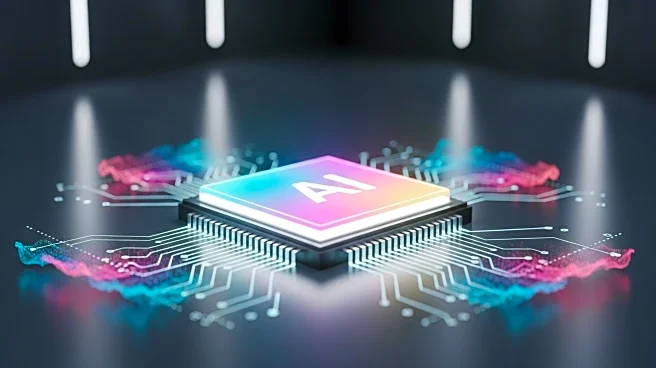What is the story about?
What's Happening?
A team of engineers has developed a groundbreaking computer chip that uses light instead of electricity to perform complex AI tasks, such as image recognition and pattern detection. This innovation significantly reduces energy consumption, achieving efficiencies 10 to 100 times greater than current chips. The chip utilizes lasers and miniature lenses integrated onto circuit boards to perform convolution operations, a key process in AI interpretation of visual and textual data. In trials, the chip demonstrated 98% accuracy in recognizing handwritten digits, comparable to traditional electronic chips. The research, led by Volker J. Sorger at the University of Florida, was published in the journal Advanced Photonics.
Why It's Important?
The development of this light-based AI chip represents a major advancement in AI technology, potentially alleviating the substantial energy demands AI places on power grids. By reducing energy consumption, this innovation supports the scalability of AI systems, enabling more advanced models without increasing environmental impact. Industries reliant on AI, such as tech companies and data centers, stand to benefit from reduced operational costs and improved efficiency. The integration of optical computing into AI chips could become standard, influencing future designs and applications across various sectors.
What's Next?
The research team anticipates that chip-based optics will soon be integral to AI chips used daily, with optical AI computing becoming a standard feature. As chip manufacturers like NVIDIA already incorporate optical elements, the transition to convolution lenses may be seamless. This development could lead to widespread adoption in AI systems, prompting further research and innovation in photonic computing. Stakeholders in the semiconductor industry and AI technology are likely to explore the commercial viability and scalability of this new chip design.
Beyond the Headlines
The shift to optical computing in AI chips could have broader implications for the tech industry, including ethical considerations regarding energy consumption and environmental impact. As AI systems become more efficient, there may be increased scrutiny on how these technologies are deployed and their societal effects. Additionally, the advancement in photonic computing could spur new research into other applications of light-based technology, potentially leading to breakthroughs in fields like telecommunications and quantum computing.















